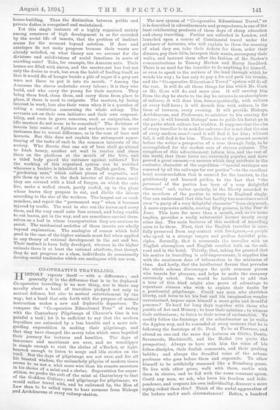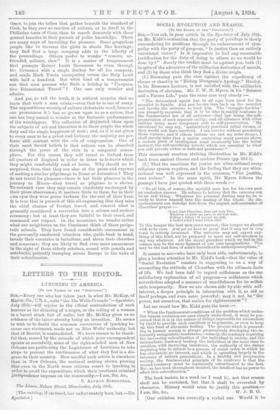CO-OPERATIVE TRAVELLING.
HISTORY repeats itself — with a difference ; and generally it is the difference that is to be deplored. Co-operative travelling is no new thing, nor is there any novelty about a band of travellers pledged not only to mutual defence, but also to mutual entertainment by the way; but a band that sets forth with the purpose of mutual instruction makes a new and deplorable departure. To compare the "Co-operative Educational Tour" of to-day with the Canterbury Pilgrimage of Chancer's time is too painful a task ; let it be sufficient to say that the modern travellers are animated by a less humble and a more mis- guiding superstition in making their pilgrimage, and that they have changed the merry tales which once beguiled their journey for lectures and homilies. The days of innocence and merriment are over, and no worshipper is simple enough to visit the shrine of a'Becket, or light- hearted enough to listen to songs and idle stories on the road. But the days of pilgrimage are not over, and for all his boasted wisdom, the melancholy pilgrim of modern times seems to us not a whit more wise than his remote ancestors in his choice of a saint and a shrine. Superstition for snper- stition, we prefer the cult of the saint at Canterbury to that of the Goddess Culture ; and pilgrimage for pilgrimage, we would rather travel with, and be enlivened by, the Man of Law than to be called upon to hear sermons from Bishops and Archdeacons at every railway-station. The new system of "Co-operative Educational Travel," as it is described in advertisements and prospectuses, is one of the least exhilarating products of these days of cheap education and cheap travelling. Parties are collected in London, and launched upon a course of Continental travel under the guidance of lecturers, who will explain to them the meaning of what they see, take their tickets for them, order their dinners, pay their bills, interpret their wants, accompany their walks, and instruct them after the fashion of Mr. Barlow's communications to Tommy Merton and Harry Sandford. There is no need for the traveller to do anything for himself, or even to speak to the natives of the land through which he wends his way ; he has only to pay a fee and pack his trunks, and the "Co-operative Educational Travel" system will do all the rest. It will do all those things for him which Mr. Cook or Mr. Gaze will do, and more also. It will envelop him from the day he starts to the day he returns in an atmosphere of culture; it will dose him, homoeopathically, with culture at every half-hour ; it will drench him with culture, in the form of lectures, every evening. It will provide Bishops, Archdeacons, and Professors, to minister to his craving for culture ; it will furnish Bishops' sons to guide his footsteps in the paths which culture has trodden. It supposes that the aim of every traveller is to seek for culture—for is not that tho aim of every modern man ?—and it will find it for him ; without fail, it will find it for him. There lies at the present moment before the writer a prospectus of a tour through Italy, to be accomplished for the modest sum of sixteen guineas. The compilers of this advertisement inform him, and the rest of the world, that these tours are extremely popular, and have proved a great success,—a success which they attribute to the exclusive character of the expedition—" special carriages are reserved by all the railways for our parties "—to the excellent hotel accommodation that is secured for the tourists, to the gentlemanly and learned guides, to the fact that "the personae/ of the parties has been of a very delightful character," and, rather quaintly, to the liberty accorded to the members of the parties to return to England singly. One can understand that this last facility has sometimes saved even "a party of a very delightful character " from shipwreck. A more expensive article, costing fifty guineas, is the Tour de Luxe. This lasts for more than a month, and, as its name implies, provides a really substantial lecture nearly every other day. The main features of this method of travelling seem to be these. First, that the English traveller is care- fully preserved from any contact with foreigners,—a people who speak in a strange tongue and profess doubtful prin- ciples. Secondly, that it surrounds the traveller with an English atmosphere and English comfort both on the rail- road and in the hotel. Thirdly, that, taking for granted that his motive in travelling is self-improvement, it supplies him. with the maximum dose of information in the minimum of time. And lastly, that the intellectual flavour that pervades the whole scheme discourages the quite common person who travels for pleasure, and helps to make the company extremely select. One would be inclined to add that a tour of this kind might also prove of advantage to repentant sinners who wish to expiate their faults by a penitential pilgrimage. Could any man who cherishes liberty, and loves to let his feet and his imagination wander unrestrained, impose upon himself a more grim and dreadful penance? To herd for long days together with those who prattle of Art and History ; to hear their opinions ; to witness their enthusiasm ; to listen to their notes of exclamation. To meekly follow the footsteps of the schoolmaster as he walks the Appian way, and be reminded at every moment that he is following the footsteps of St. Paul. To be at Florence, and attend on one and the same day lectures on Giotto, Dante, Savonarola, Machiavelli, and the Medici (we quote the prospectus). Always to have with him the voice of his fellow-disciples, their foolish comments, and their gushing babble ; and always the dreadful voice of the urbane professor who goes before them and expounds. To allow himself to be artificially crammed like a Strasburg goose. To live with other geese, walk with them, cackle with them in chorus, and be fed with the same constant spoon. Could any man, we ask, who loves his freedom and inde- pendence, and respects his own individuality, discover a more trying ordeal than this I' Think of the awful aggravation of the lecture undtr such circumstances! Better, a hundred times, to join the tribes that gather beneath the standard of Cook, be they ever so careless of culture, or to dwell in the Philistine tents of Gaze, than to march demurely with these genteel fanatics in their pursuit of polite knowledge. There are many ways of travelling for pleasure. Some gregarious people like to traverse the globe in shoals like herrings ; they find that a large company adds to the hilarity of the proceedings. Others prefer to wander "remote, un- friended, solitary, slow." It is a matter of temperament that prompts Robert Louis Stevenson to roam through the Cevennes with a single donkey for all his company, and sends Mark Twain scampering across the Holy Land with half a hundred. But what kind of a temperament can that man possess who finds a holiday in "Co-opera- tive Educational Travel " P One can only wonder and admire.
And yet, to tell the truth, it is without surprise that we learn that such a man exists,—even that he is one of many. The superstitious worship of culture (detestable word, however one pronounces it !) has so grown upon us as a nation, that one has long ceased to wonder at the fantastic performances of the worshippers. The collection of disjointed ideas upon the subjects of art and literature is to these people the whole duty and the single happiness of man ; and, as it is not given to every man to be a priest and lecturer, the majority are per- force still content with the wile of congregation. One of their most fervid beliefs is that culture can be absorbed through the pores of the skin in a congenial atmos- phere. For this reason they will travel to Oxford from all quarters of England in order to listen to lectures which they might comfortably read at home. Why should we be surprised, then, that they are also at the pains and expense of making a similar pilgrimage to Rome or Jerusalem ? They do not travel for pleasure—there is but little pleasure in the journey to Mecca—they travel as pilgrims to a shrine. To outward view they may remain absolutely unchanged by their pions observance ; it matters little to them, for in their am eyes they wear green turbans for the rest of their lives. It is true that in pursuit of this all-engrossing idea they miss the chief charms of foreign travel, and convert what is generally considered a recreation into a solemn and austere ceremony ; but at least they are faithful to their creed, and command our respect. In the meantime, we wonder rather what our neighbours on the Continent think of these peripa- tetic schools. They have found considerable amusement in the personally conducted islanders who, guide-book in hand, invade their countries in battalions, and storm their churches and museums; they are likely to find even more amusement in the sight of these elderly scholars, armed with pencils and notebooks, patiently tramping across Europe in the wake of their schoolmaster.



































 Previous page
Previous page